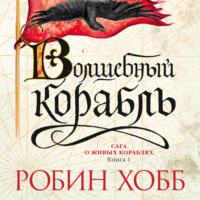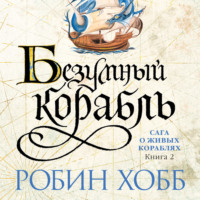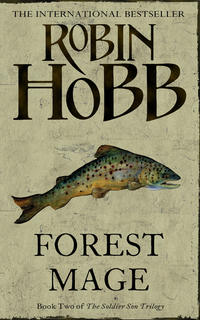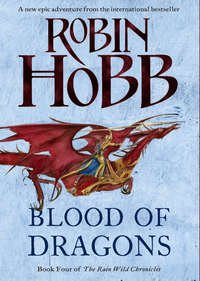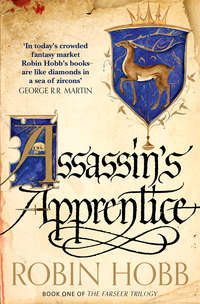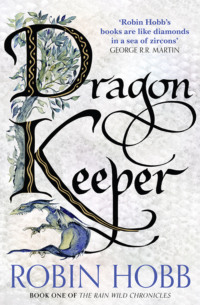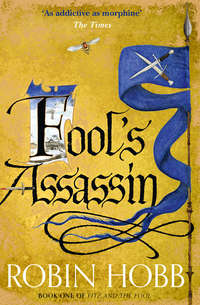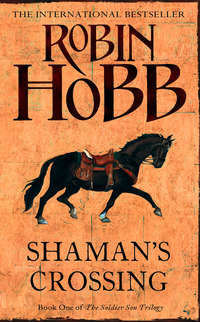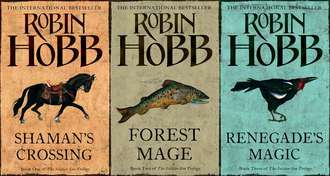
Полная версия
The Complete Soldier Son Trilogy: Shaman’s Crossing, Forest Mage, Renegade’s Magic
Corporal Curf lacked part of his right foot, but it did not slow him much. He oversaw our hay and grain fields, from ploughing to planting to harvest. He had much enthusiasm for irrigation, and often he and my father discussed the feasibility of such an engineering project. He had seen plainspeople employ such tactics to bring water to their seasonal fields in the east, and was eager to attempt an experiment to duplicate their success. My father’s stance was to grow what the land would naturally support, in accordance with the good god’s will, but Curf burned to bring water to the upper fields. I doubted the question would be resolved in my lifetime. Curf worked tirelessly for my father, trying all sorts of tactics to try to restore the fertility of the land after its third year of use.
Sergeant Refdom was our orchard man. This was a new area of endeavour for us. My father saw no reason why fruit trees should not flourish on the hillsides above the grain fields. Neither did I, but flourish they did not. Leaf curl blight had all but killed every one of the plum trees. Some sort of burrowing worm attacked the tiny apples as soon as they formed. But Sergeant Refdom was determined, and this year he had brought in a new variety of cherry that seemed to be establishing well.
Each day we returned to the house by mid-morning. We shared tea and meat rolls and then my father dismissed me to my classes and exercises. He deemed it wise that I learn the basics of husbanding our holdings, for when my soldiering days were over, I would be expected to come home and serve my brother as his overseer in his declining years. Should any untimely illness or mishap befall Rosse before then, he could by law ask the King that his soldier brother be returned to him for the ‘defence of his father’s lands’. It was a fate that I nightly prayed to be spared, and not just out of fondness for my solid older brother. I knew that I had been born for the cavalla. The good god himself had made me a second son, and I do believe that he grants to all such the fibre of character and adventurous spirit that a soldier must possess. I knew that eventually, when my days of riding to battle were over, I must return to our holdings, and probably take up the duties of Corporal Curf or Sergeant Refdom. All my sons would be soldiers and to me would fall the training of my elder brother’s soldier son, but all my daughters would take whatever dower they carried from our family holdings. It behooved me to know the operation of them, so that when my time came to contribute directly to their upkeep, I’d be a useful man.
But my heart was full of dreams of battle and patrol and exploration as our forces pushed ever deeper into the wild lands, winning territory, riches and resources for good King Troven. In the border lands to the east, our troops still skirmished with the former inhabitants of the lands there, trying to make them settle and see that the greater good of all demanded that they accept our civilization. My greatest fear was that we would be able to subdue them before I reached my soldiering age, and that instead of battle, I would spend my years of duty in administrational tasks. I dreamed that I would be there on the day when his King’s Road finally pushed through the Barrier Mountains to the shores of the Far Sea. I wanted to be one of the first to ride triumphantly the length of that long road, and gallop my horse through the surf of an alien ocean on a foreign beach.
The rest of the mornings of my last year at home were spent at book lessons. The afternoons were completely weapons practice now. The two hours that once had been mine for leisure reading or boyish amusements vanished. My childhood fascination with naming and classifying the stones that had ‘killed’ me now had to be set aside for a man’s pursuits. Spending an hour listening to Elisi practise her music, or helping Yaril gather the flowers for the vases in the parlour and dining room were no longer worthy of my time. I missed my sisters, but knew it was time I focused my attention on the world of men.
Some of the lessons were tedious, but I kept a good discipline, aware that both my father and my tutors judged me not only on how well I could repeat my lessons but also on the attitude I displayed. A man who wishes to rise to command must first learn to accept commands. And no matter how high I rose in the ranks, there would always be someone above me to whom I must bow my head and whose authority I must accept. It behooved me to display that I could accept the harness of discipline and wear it willingly. In those days, the sole ambition I possessed was the one that had been with me since birth: I would make my family proud of me. I would force my father to hold me in high esteem.
In the evenings, after dinner, I now joined my father and Rosse in the study for adult conversation about our holdings and politics and the current news of the realm. As I would not be allowed to either smoke or drink during my Academy years, my father advised me not to cultivate an indulgence for tobacco and to limit my liquor to the wine always served with our meals and a single brandy after dinner. I accepted that as a sensible restriction.
The third weeks of every month of my nineteenth year were to my liking. Those days were given over entirely to Sergeant Duril’s ‘finishing school’ as he laughingly called it. Sirlofty had become my daily mount and I strove to make my horsemanship worthy of that excellent steed. Sergeant Duril now made it his business to toughen me as befitted a cavalryman, as well as to perfect my execution of the more demanding drill movements.
Duril had been a drill sergeant for new recruits at his last outpost, and knew his business well. He worked with me on precision drill until I swore I could feel every set of muscles in Sirlofty’s body and knew exactly how to match my body to my horse’s as he moved. We did battle leaps, kicks and spins, high-stepping parade prance and the demanding cadence gaits.
We rode out often over the wide prairie wastelands. Now that I had a man’s years, Duril spoke to me more as an equal. He taught me the plants and creatures of that region as he and my father’s troops had utilized them, for survival sustenance, and gradually reduced my packed supply of water and food until I had learned to go for several days with only what we could scavenge from the land itself. He was a demanding taskmaster, harsher in some ways than Dewara had been, but Duril set the example himself and never let his strictness pass the line into abuse. I knew he carried emergency supplies in his saddlebags, yet he limited himself just as he did me, and proved by example how little a man could survive on if he employed his own resourcefulness. If he required me to learn how to find cactus-borers, he demonstrated looking for their holes in the spiny palms of the flathand cacti, and showed me, also, how to cut my way to the heart of the colony where the fat yellow grubs could provide a nourishing, if squirmy, meal for a desperate soldier. He was a natural storyteller and the veteran of many campaigns. He illustrated his lessons with stories from his own experience. I often wished that my history books were more like his anecdotes, for he made the plains Campaigns the history of his life. He never expected me to do anything he had not proven that he could do also, and for that my respect of my gruff teacher was boundless.
Toward the end of my training with Duril, in the beating hot days of summer, he took me out to prove myself on a five-day jaunt over the waterless and scrubby terrain of the rough country to the east of Widevale. On the third day, he took my hat from me and made me ride bareheaded under the sun, saying not a word until I finally halted and fashioned myself some head protection by weaving a crude hat from sagebrush twigs. Only then did a smile break his craggy face. I feared he would mock me, but instead he said, ‘Good. You figured out that protecting yourself from sunstroke is more important than saving your dignity. Many a failed officer put his dignity before the need to maintain a clear mind for himself so that he can make good decisions for his troops. It’s even worse when those in command won’t let their troops do what they must to survive. Captain Herken comes to mind. Out on patrol, and a watering spot he’d been relying upon reaching turned out to be a dry hole. His men wanted to use their urine. You can drink it if you have to, or use it to damp your clothes and be cooler. He wouldn’t let them. Said no command of his was going to be piss-breathed. He chose death for a third of them over a little bit of stink. Far better a sage-hat and a sensible leader than a bare-head and ridiculous orders from some fool suffering from heatstroke.’
It wasn’t the first time he’d told me such rough tales of survival. I never asked my father about them, and of course I’d never repeat such stories about the house. I think I understood that by putting me with this man, my father signalled his approval of whatever harshly won knowledge the sergeant chose to pass on to me. Duril might lack a lofty pedigree, but he was a soldier’s soldier, and as such my father respected him.
That night, when we camped around a smoky little fire of resinous branches near a thornbush-ringed water hole, he led the conversation to the history of the cavalla. For him, it was not dates and distant places and the strategy of campaigns. It was the story of his life. He’d joined when he was barely a lad, back in the days when the mounted forces did little more than patrol the existing borders of Gernia and hold the lines against the plainspeople. It had not seemed a promising career choice when he’d joined. I think I alone knew Duril’s deepest secret. He was no true soldier son, only the fourth son born to a shoemaker in Old Thares. His family had given him over to the King’s Cavalla in a sort of fatalistic despair. A city needs only so many cobblers. If he’d remained in the Old Thares, he’d either have starved at home or become a thief on the streets. He’d told me a few tales of Gernia in those days. The Long War with Landsing had ended in our defeat in the days of King Darwell, father of our present king. Generations of fighting had earned us only the loss of our coastal lands and our best coal-mining region. Landsing had taken our ports, leaving us with no access to the Locked Sea. Bereft of our ports and the rich veins of coal that had been our main export, Gernia was weakening like a fasting man. Our defeated navy was shamed, both ships and seaports gone. Our army and cavalla were little better, shunned and mocked when they abandoned their uniforms to become beggars, despised as cowards and incompetents if they chose to remain in the service of the King. Such was Sergeant Duril’s introduction to life as a military man. He began by blacking and polishing boots for cavalla officers who seldom wore them any more, for our former foes were the victors and there were no more battles in which honour might be reclaimed.
Duril had served three years when King Darwell died and King Troven inherited the crown. To hear Duril tell it, the young king had single-handedly stopped Gernia’s slide into despair. He mourned his father for three days, and then, instead of convening his Council of Lords, he summoned his military commanders to him. Even as he gathered that group and offered them what remained of the funds in his depleted treasury to rebuild Gernia’s might, his nobles muttered that they would not again follow a king into battle against Landsing, that four generations of near-constant war had left them beggared as well as defeated.
But it was not west to Landsing and the lost province that young King Troven turned his eyes. No. King Troven was weary of the plainspeople’s incursions against his remote settlements. He had decided that if they would not respect the boundary stones that had been mutually set four score of years ago, then he would not, either. The King sent his cavalla forth with the commands not only to push the plainspeople back, but also to set the boundaries anew and take new territory to replace that lost to the Landsingers.
Some of the King’s lords did not support him in that ambition. The plains were despised as wastelands, not fit for agriculture or grazing, too hot in the summer and too cold in the winter. We traded with the peoples of the region, but only for raw goods, such as furs from the northern reaches. They were not farmers and had no industry of their own. Some were nomads, following their herds. Even those who cultivated small fields were migratory, wintering one place and summering another. They themselves admitted that no one owned the land. Why should they or our own nobles dispute our right to settle it and make it productive?
Duril remembered the brief and bloody Nobles’ Revolt. Lord Egery had risen before the Council of Lords, asking them why more sons should shed their blood for sand and stone and sagebrush. The traitor had advocated overthrowing young Troven, and allying themselves with our old enemies for the sake of port concessions. King Troven had put the revolt down decisively and then, instead of punishing the rebels, rewarded those families that had given him their soldier sons to send into that battle against their fellow lords. King Troven altered the emphasis of his military, pouring men and money into the cavalla, the mounted troops descended from old knighthood, for he judged that force could best deal with the ever-mounted plainspeople. He dissolved his navy, for he no longer had a port or ships for them. Some folk mocked the idea of putting sailors on horseback and commodores in command of ground troops, but King Troven simply asserted that he believed his soldier sons and their commanders could fight anywhere that their patriotism demanded. His men responded to his confidence.
In that fashion had the Kingdom of Gernia increased by a third of its size since Sergeant Duril had been a boy.
The Plains War had not been a war at first. It had been a series of skirmishes between the nomads and our folk. The plainspeople had raided us, attacking our military outposts and the new settlements that sprang up around them; we had retaliated against their roving bands. The plainspeople had initially assumed that King Troven was merely reasserting his right to his own territory. It was only when we not only moved our boundary stones but started planning and erecting citadels and then settlements that the plainspeople realized that the King was in earnest. Twenty years of war had followed.
The plainspeople counted themselves as seven different peoples, but our records showed there were clearly more than thirty different clans or tribes. They often travelled in smaller bands. They roved and in their own way, ruled the plains, plateaus and rolling hills to the north. Some herded sheep or goats, others their long-necked dun-coloured cattle that seemed immune to every sort of weather. Three of the lesser tribes were simple hunters and gatherers, regarded by the other nomads as primitives. They tattooed their faces with swirling red patterns and believed that they were kin with the barking rats, the rodents of the prairie that sometimes riddled acres of ground with their burrows and tunnels. The Ratmen likewise dug tunnels into the earth and stored seeds and grains in them. They had made little resistance to our eastward expansion, and had actually enjoyed their new fame as an oddity. A number of artists and writers from Old Thares had visited them to document their strange lives, enriching the rat people with fabric, scissors and other trade items.
The Kidona had been the predators, the raiders who lived by attacking the others. The nomadic tribes had moved in a seasonal migration pattern, following grazing for their animals, and the Kidona had followed them, just as predators followed the migratory antelope of the plains. For generations, Gernian traders ventured out to barter with the plateau and hill folk for furs when the tribes came together for their traditional autumn trade gathering, but for the most part, our peoples had ignored one another.
‘For generations, they had nothing we wanted, and we knew they would fight like devils to keep it. They had their magic, and the few times we’d crossed swords with them, we’d come out the poorer for it. How can you fight a man who can send your horse to his knees by flapping a hand at him, or wave a bullet aside? So we left them alone. We were a seafaring folk. We had our territory, and they had theirs. If the Landsingers hadn’t bottled us up like they did, maybe we would have ignored the plainspeople forever. It was only when we were pressed for territory that we pressed them as well. We’d always known that iron could stop plains magic; the problem was getting close enough to use iron against them. In olden times, one of the Gernian kings had sent knights out to avenge a murdered nobleman’s son. Their magic couldn’t knock down an iron-armoured knight or his shielded horse, but we couldn’t catch up to them to do them any harm! They just fled. We tried archers, but a shaman could warp their bows with one flick of his finger. Lead ball? They’d slow it, catch it, and keep it for a trinket. But once we learned to use iron pellet in our muskets, well, the tide turned then. They couldn’t turn iron shot, and a scatter gun full of round iron pellet shot from ambush could take out one of their raiding parties with one blast. Suddenly we could pick one of their war-shamans out of his saddle at two to three times the distance they expected. You didn’t even have to kill him; just put enough iron shot in him that his magic left him. They couldn’t even get close to us.
‘Yet even then, if ever the tribes had thought to unite and fight us, well, chances were, they could have driven us back. They were nomads, their boys born to the saddle, and horsemen such as we’ll never see again. But that was their weakness, too. When drought or plague or territorial disputes struck, why, if they couldn’t win, they just up and moved into new territory. And that’s what they kept doing, moving away as we advanced, losing cattle and sheep and possessions as they gave ground to us. Some of the smaller bands settled, of course, made peace with us and realized they’d have to live like regular folks now, keeping house in one place. But some just kept on fighting us, until they found the Barrier Mountains at their backs. Forest and mountains are no place for horse troops. That was when the fighting really got ugly. We had crowded the different tribes up against one another. Some of them turned against their own kind. They knew they’d lost almost all their old grazing lands. The best parts of their herds and flocks were forfeit to us or dead behind them. They could look out over the plains from the high plateaus and see our citadels and our towns rising where once their beasts had grazed. The battle at Widevale was one of the worst. They say that every man of fighting age of the Ternu tribe died there. We took in their women and children, of course. It was only the right thing to do. Settled them down and taught them how to live right, how to farm and how to read. That battle was harsh and vicious, but in the end, it worked a kindness for those folks. Your da has done right by them, giving them sheep and seed and teaching them how to make a life in one spot.
‘Not like the Portrens tribe. They chose to die to the last soul, men, women, and children. Not a thing we could do to stop them. When it was plain that the battle tide had turned against them, and they’d either have to bow their heads and become good subjects to King Troven or be driven up into the mountains, why, they just turned tail and rode their horses into the Redfish River. I saw it myself. We were trailing the Portrens with our forces, still skirmishing with them. Most of their powerful magic users had fallen to us days before; they couldn’t do much more than hold their protective charms around them. We thought we could make them stop and surrender. We knew they’d come up against the river soon, and it was in spring flood from the snowmelt in the mountains. Must have been two hundred men mounted, their striped robes and kaffiyeh floating in the wind of their passage, riding guard around their women and children in their pony chariots. We thought they’d stop and surrender, I swear we did. But they just rode and drove straight into the river, and the river swept them away and that was the end of them. It wasn’t our doing. We would have given them quarter if they asked for it. But, no, they chose death and we couldn’t stop them. The men stood guard on the bank until every one of the women and children were swept away. Then they rode in after them. Wasn’t our fault. But many’s the trooper who hung up his spurs after that battle and lost all heart, not just for fighting but for the cavalla life. War was s’posed to be about glory and honour, not drowning babies.’
‘It must have been a hard thing to see,’ I ventured.
‘They chose it,’ Sergeant Duril replied. He leaned back on his bedroll and knocked the ash out of his pipe. ‘Some as rode alongside me saw it as watching death. A few of the lads near went mad. Not at the moment; at the time we just sat on our horses and watched them do it, not fully understanding that they were choosing death, that they knew they couldn’t make it to the other side. We kept thinking there was some trick to what they did, a hidden ford they knew of or some magic of their own that would save them. But there wasn’t. It was afterwards that it bothered some of my mates. They felt like we drove them to it. But I swear, it wasn’t so. I decided I was watching a free people make a choice, probably one that they’d talked about before they came to it. Would we have been more right to try and stop them, and insist they give up their roving ways? I’m not sure. I’m not sure at all about that.’
‘Only a plainsman can understand how a plainsman thinks,’ I said. I was quoting from my father.
Sergeant Duril was packing more tobacco into his pipe and at first he didn’t answer me. Then he said quietly, ‘Sometimes I think being a cavalryman turns you into a plainsman, somewhat. That maybe we were almost coming to understand them too well before the end. There’s a beauty and a freedom to riding over the flatlands, knowing that, in a pinch, you and your horse can find everything you need to get by on. Some folk say that they can’t understand why the plainspeople never settled down and used the land, never made their own towns and farms and tame places. But if you ask a plainsman, and I’ve asked more than a few, they all ask the same question in return. “Why? Why live out your life in one place, looking at the same horizon every morning, sleeping in the same spot every night? Why work to make the land give you food when it’s already out there, growing, and all you have to do is find it?” They think we’re crazy, with our gardens and orchards, our flocks and herds. They don’t understand us any more than we understand them.’ He belched loudly and said, ‘Excuse. Course, now there aren’t many plainspeople left to understand. They’ve settled in their own places, under the surrender terms. They got schools and little stores now, and rows of little houses. They’ll be just like us, in another generation or two.’
‘I’m sorry to have missed them,’ I said sincerely. ‘Once or twice, I’ve heard my father talk about what it was like to visit one of their camps, back in the days when he rode patrol and sometimes they came in close to the boundaries to trade. He said they were beautiful, lean and swift, horses and people alike. He spoke of how the plainspeople tribes would gather, sometimes, to compete in contests of horsemanship, with the daughters of the ruling lords as the prizes. He said it was how they formed their alliances … Do you really think those days are gone?’
He nodded slowly, smoke drifting from his parted lips. For a time, human silence held, but the prairie spoke between us, a whispering wild voice, full of soft wind and rustling brush and little creatures that moved only by night. I relaxed into the familiar sounds and felt them carrying me closer to sleep.
‘They’re gone,’ he confirmed sadly. ‘Gone not just for them, but gone for us old soldiers, too. Gone, never to come again. We began the change; we swept away what had been here for hundreds of years. And now … well, now I fear that we were just the ones at the front of the charge, so to speak. That we may go down with those we defeated, and be trampled under by those who come after us. Once the plainspeople are tamed, what use is an old soldier like me? Change, and more change …’ He fell silent and I cared not to add any words to his. His thoughts had put a chill in my night that had not been there before.


